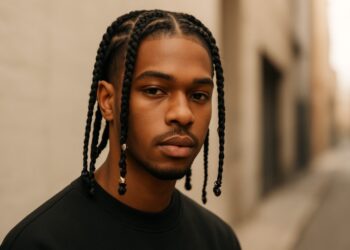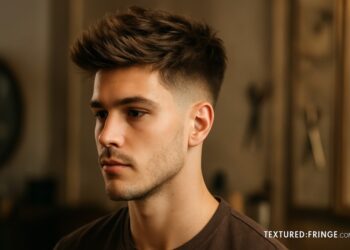Walk down any busy street in New York, London, or Paris, and chances are you’ll spot someone rocking a textured fringe. It’s not just a hairstyle anymore—it’s an attitude, a little nod to effortless cool. Unlike perfectly polished blowouts, textured fringes have that undone, lived-in vibe that feels authentic.
I still remember the first time I tried one. I walked out of the salon thinking, “Is it too messy?” But the compliments rolled in instantly. Friends kept saying it looked fresh, light, and gave me a style update without going overboard. That’s the magic of a textured fringe—it frames your face, softens your look, and somehow manages to be casual and chic at the same time.
So, why is everyone copying this street style staple? Let’s break it down.
What Makes Street Style Special?
Street style isn’t about what’s trending on runways. It’s about how real people interpret fashion and beauty in their daily lives. It’s raw, experimental, and personal. When it comes to hair, street style trends often spread faster than traditional fashion shows. One photo snapped outside a café or fashion week venue can spark a global movement.
A textured fringe fits right into that space. It’s versatile—you can pair it with jeans and sneakers or a silk slip dress and heels. Plus, it doesn’t scream, “I spent three hours styling my hair.” Instead, it gives off the vibe of “I woke up like this, and yes, I look cool without trying too hard.”
The Appeal of a Textured Fringe
Why does a textured fringe feel so different from a regular fringe? Here are a few reasons:
- Effortless vibe: The choppy layers and uneven finish keep it from looking too rigid.
- Face-framing magic: Whether you’ve got round, square, or oval features, a textured fringe softens edges and balances proportions.
- Low maintenance: Unlike blunt bangs that demand constant trimming, textured fringes grow out more naturally.
- Style chameleon: You can blow-dry it sleek, scrunch it with mousse, or just let it air-dry—it always tells a slightly different story.
It’s the hairstyle equivalent of your favorite leather jacket: slightly rebellious, universally flattering, and timeless.
Popular Street Style Textured Fringe Looks
1. Effortless Messy Fringe
Think of this as the signature “street chic” look. A fringe that’s slightly parted in the middle, with soft waves running through. It’s not perfectly aligned, and that’s the point—it feels spontaneous.
2. Sleek Yet Relaxed Fringe
For days when you want to look polished but not uptight, a sleek blow-dried fringe with feathered edges works wonders. Pair it with straightened strands or a neat ponytail for a minimalist vibe.
3. French-Girl Inspired Fringe
No one owns the textured fringe like Parisian women. Their secret? Wispy bangs that look like they’ve been casually trimmed at home, paired with undone waves and minimal makeup. It’s chic without trying too hard.
4. Wavy Street Style Fringe
If your hair has natural movement, lean into it. A wavy textured fringe adds softness and volume. It works especially well when paired with layered cuts.
5. Short & Edgy Textured Bangs
A micro fringe with choppy ends is bold, daring, and perfect for making a statement. This one’s often spotted during fashion week on risk-takers.
6. The “Bedhead But Chic” Fringe
This is the kind of fringe that looks like you didn’t even touch a brush in the morning—but in the best way possible. Pair with tousled hair and light texturizing spray.
7. Fringe with Layers & Shag Cuts
The revival of the 70s shag has made fringes edgier. Textured bangs paired with layers throughout the hair give off rocker-chic vibes.
How to Style a Textured Fringe for Everyday Wear
Styling a fringe doesn’t need to be complicated. Here’s a realistic approach:
- Morning refresh: Spray a little dry shampoo to lift roots.
- Heat styling: Use a round brush and blow dryer to curve the ends slightly inward.
- Low-maintenance trick: If it’s too flat, scrunch with a texturizing spray.
- Day-to-night switch: Tuck the fringe slightly behind one ear for a casual look, or let it fall naturally for evening drama.
Personal note: On lazy days, I literally just twist my fringe with damp fingers and let it dry. Somehow, it always ends up looking “styled.”
Street Style Fringe for Different Hair Types
Straight Hair
A textured fringe adds movement and breaks up the severity of pin-straight locks. Think K-pop inspired cuts with playful softness.
Wavy Hair
This is the ideal match. The natural wave makes the fringe look breezy and relaxed without much effort.
Curly Hair
Yes, curls and fringes can coexist! The trick is layering—cutting the fringe to blend with curl patterns. It creates a bold yet approachable look.
Fine Hair
A choppy fringe can give the illusion of thickness. Add volume sprays to enhance it.
Thick Hair
Thick-haired folks benefit from texturing shears that remove bulk, preventing the fringe from sitting too heavily.
Seasonal Street Style Fringe Inspiration
- Summer Breeze Fringe: Light, wispy cuts that don’t stick to the forehead. Pair with messy buns and sundresses.
- Autumn Layered Fringe: Heavier fringes with caramel highlights look great against fall fashion layers.
- Winter Cozy Fringe: Fuller fringes paired with oversized scarves and coats give off warm, cozy vibes.
- Spring Playful Fringe: Fresh trims with soft curls to match the season’s light, fun mood.
Mistakes to Avoid with Textured Fringe
- Cutting it too short (it grows out unevenly).
- Over-styling with heavy products (leads to greasy forehead).
- Ignoring trims—fringes need refreshing every 4–6 weeks.
- Forgetting about weather—humidity can ruin shape, so always carry a mini spray.
Celebrity & Influencer-Inspired Street Style Fringe
From Alexa Chung’s effortless waves to Zendaya’s red-carpet fringes, textured bangs have taken over pop culture. Influencers often pair them with oversized coats, vintage sunglasses, or sneakers—proving the fringe isn’t limited to one aesthetic.
Maintenance Tips (Trimming, Products, Styling Tricks)
- Trimming: Every 4–6 weeks to maintain shape.
- Products: Texturizing sprays, lightweight mousse, and dry shampoo are staples.
- Tools: A round brush and mini flat iron for touch-ups.
- DIY rescue: If it splits in the middle, spritz with water, blow-dry downward, and clip in place for 10 minutes.
Conclusion
Street style thrives on individuality, and a textured fringe captures that essence perfectly. It’s versatile, flattering, and adaptable to every mood, season, or outfit. Whether you’re after Parisian charm, edgy boldness, or casual chic, there’s a textured fringe look worth copying for everyone.
FAQs About Street Style Textured Fringe
Q1. Is a textured fringe high maintenance?
Not at all. Unlike blunt bangs, textured fringes grow out naturally and don’t demand constant salon visits. A quick trim every 4–6 weeks is usually enough to keep them fresh.
Q2. Will a textured fringe suit my face shape?
Yes, absolutely. The beauty of a textured fringe is its flexibility—it can be customized to flatter round, square, oval, or even heart-shaped faces. A good stylist will shape it to enhance your features.
Q3. Can curly-haired people get a textured fringe?
Definitely. Curly fringes are trending! With proper layering and cutting techniques, curls blend beautifully into a textured fringe, creating a stylish and natural look.
Q4. What’s the best way to style a textured fringe daily?
Keep it simple. A quick blow-dry with a round brush, or scrunching with a texturizing spray, is usually all you need. On lazy days, even letting it air-dry can give that effortless street style vibe.
Q5. How do I stop my fringe from looking greasy?
Dry shampoo works wonders. Spray lightly at the roots, massage it in with your fingers, and your fringe will instantly look refreshed without weighing it down.





